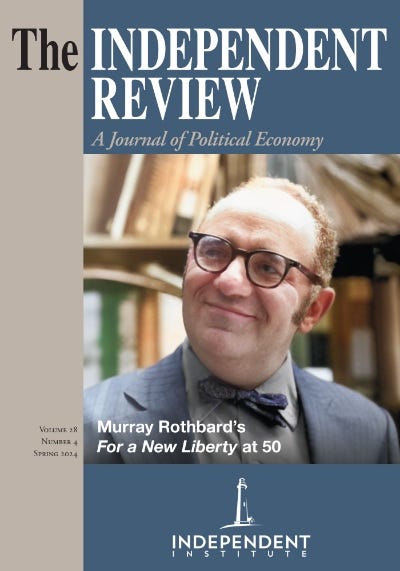Last year, the Independent Review published a special issue commemorating the 50th anniversary of Murray Rothbard’s For a New Liberty. I was asked to write an essay on the second chapter, “Property and Exchange,” which sets out what I take to be the philosophical core of Rothbard’s libertarianism. In it, he defends the ideas of self-ownership and the non-aggression principle, along with a broadly Lockean account of property in external resources. Once you’ve got all of that, the rest of his libertarian views fall into place rather neatly, and indeed the rest of the book is basically just an extended discussion of the implication of these principles for a range of issues such as welfare, foreign policy, and environmentalism.
My essay, “Libertarianism, Oversimplified,” is now available free and ungated. You can also listen to me discuss it with Caleb Brown on the Cato Daily Podcast.
The short version of my argument is this: even if you think libertarianism is true, proving it is not as easy as Rothbard makes it out to be.
For example, Rothbard tries to prove the principle of self-ownership by arguing that our only options are to embrace it, or to accept some form of slavery. Either we accept self-ownership, which logically entails (according to Rothbard) anarcho-capitalism; or we reject it, in which case we’re stuck with some form of totalitarian socialism.
But it’s obvious that those aren’t our only options. It’s obvious, in the first instance, because almost nobody on earth lives in a society that is purely libertarian or purely socialist. So if Rothbard’s argument assumes that those are the only two options, it’s clearly at odds with the world in which we actually live. You might not like the kind of mixed economy we have in the United States and most of the rest of the world, but arguing against it requires engaging with substantive moral and economic reasoning. You can’t simply declare it impossible by logical fiat.
More fundamentally, Rothbard’s argument rests on a mistaken understanding of what it means to “own” something. For Rothbard, either we own something or we don’t, full stop. So, with respect to your own body, either you’re a full self-owner or else you’re some kind of slave. But the reality is more complicated. As Barbara Fried pointed out some time ago in her critique of left-libertarianism, what we call “ownership” refers not to any simple natural kind but rather to a bundle of rights and duties, any of which might or might not be present in some particular instance of property.
Here’s an example from the paper:
Consider the ownership rights one might have over a piece of land. At its core, we might think, to own a piece of land is to have the right to use the land as one sees fit, and to exclude others from using it without one’s permission. But even if we grant this “core” concept of ownership, it leaves a great number of questions unanswered. What rights does one have to, say, the minerals located below the surface of one’s land, and how deep do one’s rights go? How high above one’s land do they go? High enough to prohibit planes from flying over it? Satellites from orbiting above it? Does your ownership give you the right to dam any rivers that might flow through your land and onto mine? If your land blocks the only path between my land and some valuable unowned resource, like an ocean, do I have the right to cross your land without permission to get there?
Once again, deciding which particular rights go into the bundle of ownership we have over a factory, a piece of land, or our own bodies is something that requires substantive engagement with moral and economic reasoning. The point isn’t that all options are equally good. The point is that deciding which one is best requires argument, and Rothbard simply hasn’t given us any on behalf of his favored position.
There’s much more about this issue in the paper, as well as a discussion of the problematic relationship between property and freedom in Rothbard’s philosophy. Read the whole thing here.



